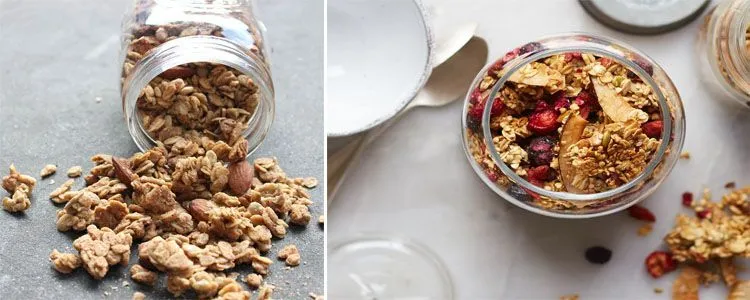The granola It is considered a very healthy cereal, and is usually consumed during breakfast. It is the result of the mixture of nines and toasted oats to which sugar, honey or any other type of sweetener is added.
Granola can also be prepared with the mixture of other ingredients such as puffed rice, some nuts, seeds, spices and nut butters.
In addition, there are other forms of granola that contain some ingredients not so recommended, such as oils or syrups, significantly increasing the content of fats and sugars.
In this article we wanted to gather all the information regarding whether or not we can consider granola as a healthy ingredient.
Table of Contents
Nutritional composition
One of the first things to keep in mind is that granola provides a lot of calories, although it also contains a good ratio of protein, fiber and minerals (mainly micronutrients).
Within these microelements, the most important are iron, magnesium, zinc, copper and selenium. Among the vitamins we find those of group B and also vitamin E.
Something to keep in mind is that granola will depend on the ingredients it is made with to evaluate its nutritional profile.
Let’s look at the nutritional profile of Kellogg’s low-calorie granola, for 100 grams of product:
- Energy: 389 kcal
- Protein: 8.7 g
- Grease: 5.7 g
- Carbohydrates: 80.9 g
- Fibre: 7 g
The nutritional profile of granola changes depending on the ingredients used. In general, they all offer a good ratio of micronutrients and fiber.
Main benefits of granola
Not many scientific studies have been carried out to know the main properties of granola, although they have been made of the ingredients that are part of it, such as almonds, chia, flax seeds, etc.
High in fiber and protein
As we have seen before, the type of granola we have analyzed contains up to 7 grams of fiber, a significant amount and more if we talk about the fact that most western diet does not take enough fiber.
The same goes for the level of protein, with almost 9 grams per 100 grams of granola.
A diet that completes the needs we require for fiber, according to the WHO, can provide us with the following benefits:
Improves blood pressure
Foods high in fiber, such as flax seeds or oats, have been shown to help lower blood pressure in the medium term. [See study]
Reduces cholesterol levels
An ingredient present in granola, such as oats, contains significant amounts of beta glucan. We are talking about a fiber class which works by reducing the concentration of cholesterol, and specifically LDL. [See study]
Controls blood sugar
Most of the nuts and seeds that are part of the granola have the ability to regulate blood sugar levels, so their consumption is interesting for patients in pre-diabetes phase. [See study]
The increase in the fiber base in our diet stimulates intestinal health, favoring a greater number of healthy microorganisms in the stomach and intestines.
In turn, it is also a source of powerful antioxidants that will strengthen our immune system.
An easy food to transport
Whether as an apéritif to take us to work, supplement for athletes or in the middle of the hiking route, granola is easy to carry and perfectly complements our nutrition. In addition, it offers very good conservation and an extra energy that we will need for all kinds of activities.
There are granola products in the form of bars, very comfortable to transport, with a long expiration date and nutritionally loaded with protein and fiber.
Aspects to improve of granola

Not all are advantages in this alimenot, since in many cases, the caloric intake is quite high and may also contain non-beneficial added sugars.
It is necessary to analyze the fat content, where there may be the presence of vegetable oils, such as coconut oil and various seeds, such as nuts.
These products can ap apPraying a caloric excess that may not interest us, contribute to increase the risk of obesity or an excess of glycemic index, so we must carefully look at the nutritional content and consume them moderately.
As a recommendation in food (according to the American USDA), you should not consume more than 10% of the total energy (kcal) in sugars, with an amount that does not exceed 50 grams. Not only pure sugar, but all the content that may be in foods such as white plan, fried tomato, preserves, etc.
Depending on the manufacturing company, it has come to find granolas that provide almost 20 grams of sugar, something not recommended and that we must avoid at all costs.
The abusive consumption of sugar is linked to the presence of chronic diseases such as heart attack, strokes, type 2 diabetes, caries and morbid obesity, among other problems. [See information scientific]
Granola could increase our weight if consumed in excess, since it usually contains a high volume of calories (including sugars and saturated fats). It is necessary to know the nutritional composition of each product since it varies markedly according to the manufacturer.
Find the healthiest granola
How there are different people on the market granola-based products, it is necessary to stop before buying and evaluate the nutritional composition, which should appear clearly and concisely on the label.
Avoid those products high in fat and added sugars. As a reference you can consult the nutritional composition that we have added at the beginning of the article for a high quality product, where fats do not exceed 6 grams for 100 grams of product.
It is recommended that among the ingredients that are part of the granola are nuts and whole foods (nuts, oats, seeds, etc.) since they have beneficial properties for our health.
The higher the fiber and protein content, the better, due to the positive effects that these two components have on our diet.
